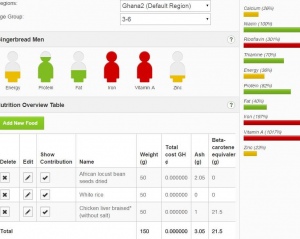School meals made healthier with new planning tool
by Francis Peel

An innovative free School Meals Planner developed at Imperial College London is improving the nutritional intake of millions of schoolchildren.
The tool, for the first time, enables users to plan nutritionally balanced and fully costed school meals using locally available food.
Developed by Imperial’s Partnership for Child Development and trialled by the Ghana School Feeding Programme, the School Meals Planner was unveiled at the Global Child Nutrition Forum 2014 earlier this month. The audience of 250 school feeding experts, including 12 state Ministers, drawn from 40 countries, welcomed the chance to learn from and replicate the success of the Ghana trial.
“Creating a nutritionally balanced school menu using local ingredients is not an easy thing to do, especially when you are working within a tight budget,” said Dr Lesley Drake, Executive Director of the PCD at Imperial. “This is doubly true when the children relying on your school meals are from communities where food insecurity is high and malnutrition and anaemia are common conditions.”

Gingerbread men show how well meals provide important nutrients
The tool, which is available both online and offline, employs gingerbread men to show visually if a meal is meeting the recommended daily intake of nutrients as identified by the UN’s Food and Agriculture Organisation and the World Health Organisation.
By linking local market prices for the ingredients, the planner shows the user the actual cost of each meal. With this information, programme managers are able to create accurate and realistic school meal budgets.
Speaking at the launch, Dr Drake said: “School meals play a vital role in ensuring children have a healthy, nutritionally balanced diet. This free tool means that you don’t need to be a nutritionist to create balanced healthy meals; anyone can do it.”
The school meals planner also works as an information source for smallholder farmers, so they know what foods to supply to schools, and as an educational resource for schools to teach children about healthy eating.

Caterers prepare children's meals in Ghana
The Ghana School Feeding Programme are using the tool to plan meals for some of the 1.6 million schoolchildren fed by the programme every school day.
Victoria Kuma-Mintah, from the Ghana School Feeding Programme said: “One of the strengths of PCD’s meal planner is that it allows us to select nutritious local dishes using local ingredients which we know our farmers are producing.”
To ensure schoolchildren have nutritionally balanced diets, the School Meals Planner is designed to work in conjunction with community-focused nutrition and hygiene education programmes and with ‘handy measures’ – everyday measuring utensils which caterers can use to accurately recreate balanced meals. This integrated school nutrition programme is the result of support from Dubai Cares and the Bill and Melinda Gates Foundation.
Following the success of the School Meals Planner in Ghana, the tool will be rolled out in other countries to ensure that millions more children are able to enjoy healthy and nutritious hot school meals.
To find out more and to plan your own meal visit www.hgsf-global.org
Article text (excluding photos or graphics) © Imperial College London.
Photos and graphics subject to third party copyright used with permission or © Imperial College London.
Reporter
Francis Peel
School of Public Health